
While much attention focuses on artificial intelligence and employment, there’s a crucial angle that isn’t being championed – the untapped talent that exists across all communities. While organisations rush to implement AI solutions, the most successful transformations are happening where digital skills development intersects with social mobility—unlocking potential that is sometimes overlooked.
A recent TUC poll found that half of UK adults are worried that artificial intelligence is going to take their jobs.¹ They needn’t be. Automation has the ability to reshape tasks yes, but it also has the power to free up individuals so they can spend more time on creativity. The organisations succeeding with AI are those investing in digital skills development that reaches beyond traditional talent pools.
As a collaborative national consortium addressing the UK’s digital skills gap, we’ve discovered that the workforce best prepared for AI collaboration isn’t necessarily limited to the one with prestigious qualifications, but the one with strong practical digital skills, regardless of background.
The Hidden AI-Ready Workforce
Traditionally, roles in data analysis, business intelligence and strategic planning required specific degrees or years of experience. Now, with AI handling complex calculations, the premium is on people who can ask the right questions, interpret results, and apply insights creatively—skills that transcend formal education.
Recent data from our digital skills programmes reveals who actually thrives when given these opportunities. Among learners on flexible, industry-relevant courses, 69% come from households earning less than £25,000 annually, nearly a quarter have disabilities or debilitating health conditions, and 48% are the first in their families to pursue higher-level learning.²
In programmes designed with accessibility at the core, completion rates exceed 80% among participants who might struggle in traditional academic settings.³ These learners often approach AI tools with fresh thinking, unconstrained by assumptions about “how things should be done.”
Take someone who has managed a household budget on limited income—they already understand resource optimization, pattern recognition and making decisions with incomplete information. Add AI tools to complement these skills, and suddenly they’re apt for business analyst roles that would traditionally require more formal qualifications.
The World Economic Forum’s prediction that employers would divide work between humans and machines equally by 2025 has become reality.⁴ This division is creating entirely new career pathways. Our experience with over one million learners reveals that AI is democratising access to previously gatekept roles.
Consider these transformations: Customer service workers who understand customer pain points can use AI analytics tools to identify trends that traditional analysts might miss. Their frontline experience, combined with AI-powered data analysis, creates insights that drive real business value. Similarly, people with caring experience understand patient needs and system pressures—with AI handling technical analysis, they improve service delivery in ways pure data scientists cannot.
The AI Skills Advantage
The key insight is that AI amplifies existing human skills rather than replacing them. Effective AI collaboration requires three competencies that many overlooked workers already possess:
Data intuition—understanding when something doesn’t look right in data and asking probing questions. Problem decomposition—breaking complex challenges into manageable parts, a skill honed through managing households or caring responsibilities. Contextual communication—translating between different stakeholder needs, a strength workers from customer service or community roles demonstrate daily.
These aren’t skills exclusive to lecture halls. They’re capabilities gained through life experience, refined through accessible digital training, and amplified through AI.
Breaking Down Barriers
When organisations invest in digital skills development that prioritises accessibility, they discover talent in unexpected places. Programmes report learners spanning ages 18 to 65+, with strong participation from women, ethnic minorities, and disadvantaged communities.⁵ These diverse teams often outperform homogeneous groups in AI implementation because they bring different perspectives to problem-solving.
If half the adults currently excluded from digital careers gained AI-collaboration skills, we could add hundreds of thousands of workers to talent-starved sectors. This isn’t theoretical—accessible programmes already demonstrate that motivated learners from non-traditional backgrounds excel in AI-enhanced roles that would have been closed to them just years ago.
Moving Forward
The evidence is clear: when we make digital skills training truly accessible, we unlock potential that transforms both AI implementation and career opportunities. Companies that combine university expertise with community partnerships create workforces capable of leading technological transformation rather than simply adapting to it.
For employers, this means looking beyond traditional talent pools and partnering with accessible training providers. For educators, it requires embedding AI literacy within broader digital skills development that reaches everyone.
Britain’s AI-enabled future depends on recognising that talent exists in every community. AI isn’t just changing how we work—it’s changing who can do what work. The question isn’t whether we have the skills for an AI economy—it’s whether we have the vision to recognize and develop them wherever they exist.




